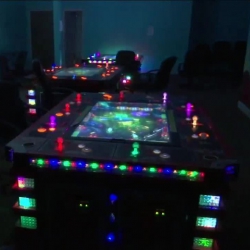The Seminole Tribe of Florida filed anti-trust lawsuits against 11 Jacksonville-area electronic gambling parlors (EGPs) and the 15 landlords which manage or lease properties for the EGPs to operate.
The Seminoles’ suit noted the electronic gambling parlors infringe upon the tribe’s gaming compact, which says it has the exclusive right in the state to conduct “casino-style” gambling.The lawsuit was filed in the Fourth Judicial Circuit Court of Duval County on Wednesday. In court documents, the Seminoles alleged that Duval County gaming operators allow patrons to “engage in various forms of casino-style gambling whereby the patrons pay money in return for which they receive a chance to win greater sums of money as prizes.”
Fifteen landlords or property managers were noted in the suit, because they “knowingly permit such unlawful gambling to take place”.
Some of the businesses named in the lawsuit were Big Chances Internet Cafe, Wild Plum Arcade, and Lucky’s Cyber Center. The various plaintiffs’ Facebook pages describe the businesses as as coffee shops, cafes, or restaurants.
Electronic Gambling Parlors’ Casino-Style Games
Barry Richard, the Seminoles’s lawyer, described the games being played in the cafes as those “you would play in a casino”. The lawyer said the cyber-cafes provide a computer interface to allow customers to play casino games. Richard said, “They are typical slot-type games, spinning games, or so-called ‘fish games,’ or card games. The essential point is that the patron pays money for the chance to win more money.”
The Seminoles’ lawsuit is the latest attempt to rein in cyber-cafes, which have variously been called sweepstakes cafes or Internet cafes over the years, usually in strip malls or standalone arcades. Cyber-cafes have been banned in dozens of states across the United States, including Florida.
HB 155 Banned Sweepstakes Cafes
In April 2013, Gov. Rick Scott signed into law HB 155, which banned Internet sweepstakes cafes. The law came after reports that a St. Augustine-based charity which ran sweepstakes cafes — Allied Veterans of the World — collected $300 million in revenues, but only distributed $6 million to charities.
At the time, the Florida Arcade Association fought a public relations and lobbying campaign to stop the legislation, noting that Rick Scott would put approximately 14,000 people out of jobs by signing the bill. FAA president Gale Fontaine said, “With the stroke of the governor’s pen, thousands of jobs were lost today. With all the effort that is put into this state to create jobs, it is unconscionable that the state is acting to put people in the unemployment line.”
The Kelly Mathis Case
Back in 2013, Jackonsville attorney Kelly Mathis was convicted racketeering and other charges. On March 14, 2016, Mathis’s conviction was overturned on appeal. State prosecutors declined to retry the case, which appears to have opened the door for an EGP comeback.
Florida newspapers began to report on that comeback this past spring. News accounts noted that EGPs had opened in several counties since the Kelly Mathis appellate decision: Volusia, Putnam, Marion and Hernando. Nick Cox of the Florida Attorney General’s Office told the Daytona Beach News-Journal that state prosecutors have a large docket of cases and sweepstakes cafes simply are not high on their list of priorities.
Nick Cox added, “The Office of Statewide Prosecution’s current priorities are fighting synthetic drugs, illegal opioids, human trafficking and gang violence. I feel that we should focus our resources on these priorities for the best interest in the state of Florida.”
Duval County Gaming Licenses
Joe Daprile, who owns the Greater Daytona Business Center which houses a cyber-cafe named Hot Spot, said that the businessess are legal, as long as they are not in incorporated areas. Daprile’s Greater Daytona Business Center is located just outside the Ormond Beach boundary, which he says makes them legal.
In April 2017, Joe Daprile said Jim Dougherty, the owner of Hot Spot, is a “good guy”. Daprile said of the cyber-cafes themselves, “Do you think the county issues licenses for Internet cafes if they’re illegal? Why would they take my money?”
Sue Parent, a customer of Hot Spot, was quoted saying, “You see old friends here and you come to socialize. We don’t hurt anybody. We’re enjoying ourselves.”
Enforcing the Tribal Gaming Compact
The Seminole Tribe of Florida does not see it that way. The Seminoles have a multi-billion dollar gaming compact with the State of Florida. Under provisions of Florida Statute 285.710, the Seminoles pays the stae $3 billion over a 7-year period, but receive a monopoly over casino-style gaming. If the monopoly is not upheld by the state, then the gaming compact is broken and the Seminoles do not have to pay the state gaming taxes. While the tribe is unlikely to pull out of the compact over a lack of enforcement of cyber-cafes, the tribe sees another way to squelch the operations.
Thus, instead of appealing to the Florida Department of Justice and go the way of prosecution, the Seminoles have filed lawsuits. The civil courts of Florida might work to shut down the cyber-cafes, or at least drain enough financial resources for lawsuits that they decide to go away.
Shuttering Duval County EGPs
The Seminole Tribe’s lawsuit calls for a shuttering of the 11 electronic gambling parlors in Duval County, along with liens against the properties on which they stand. If the Duval County injunctions work, one can expect to see the Seminole Tribe file lawsuits in Volusia County and other places around the state where electronic gambling parlors operate.
Barry Richard said his clients have a high level of confidence their lawsuits will work. The Seminole Tribe lawywer, “These are very clear violations of Florida’s gambling laws and I have a high level of confidence that the tribe is going to be successful.”

